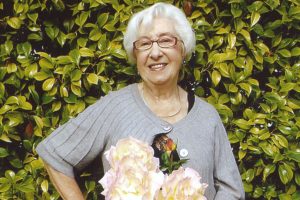Sidney woman pens wartime memoirs
By Lookout on Dec 03, 2012 with Comments 0

Anna Maria Alberts-Zeeman wrote a book called “The Peace Rose,” which is her memoirs about the Second World War in Amsterdam, including the liberation of Holland by Canadian soldiers.
Anna Maria Alberts-Zeeman has been a Canadian citizen for more than 50 years, but each spring she glances out her window in Sidney to see the Peace roses in bloom, and her thoughts turn to memories of Holland.
These large vibrant pink and yellow roses take the 84-year-old Amsterdam native back to her teenage years – a time of fear, oppression and poverty in a war-torn country.
Like many Dutch teenagers at the time, she spent her childhood in fear, wondering if her family would starve to death like so many compatriots had.
Now in her twilight years, she decided to pen her memoirs. The Peace Rose is her book that chronicles her childhood in Holland, the liberation of Holland by Canadian soldiers, her immigration to Canada, and an inspirational journey through her life.
Last year, she met with a group of soldiers from CFB Esquimalt about to attend the annual Nijmegen march in Holland.
“I told those soldiers they reminded me of the young soldiers from so many years ago during the liberation, smiling and sharing chocolate bars with us.
The Dutch will never forget what Canadians did for us. It is our life and our history. We cherish it,” she said.
Amsterdam was one of the last places in Holland to be liberated after the war.
Alberts-Zeeman was 12 when the war started and 17 when it ended.
“I lost a big portion of my teenage years. By the last year it was just survival, as Holland was downhill already economically,” she said. “We lived in darkness when the war was on because we had to put black paper on our windows. Everything had to be dark to protect both us and the Nazis from the allied air raids. The Germans took away our radios, so we had no contact with the outside world.”
Dramatic change swept the country when the Nazis systematically stripped the Jewish people of dignity and freedom.
“They had to wear a yellow cotton star of David with black etching around the star marked Jood (Jew) in the middle. They were made to leave their homes and businesses and forced to live in Nazi camps. It was a frightening time.”
As a teen, she remembers seeing gatherings of people on the streets.
“We knew it was trouble. It would either be Jewish people taken from their homes and put into trucks to go to the camps, or Dutch people helping the Jews hide or escape. Dutch people could go to jail for helping the Jewish people. They also could go to jail if they were caught listening to English radio about the progression of the war.”
Then the food supplies diminished. Germans took much of the food for themselves from the farmers.
Alberts-Zeeman remembers riding a bicycle with wooden tires to the countryside to ask farmers for food near the end of the war; then she remembers being too weak to make the journey home by bike. People were dying of starvation.
Sweden, a country neutral in the Second World War, flew planes over Holland dropping supplies of flour so Dutch bakers could bake bread.
“We looked to the sky to watch what looked like a miracle,” she recalls.
Then the Canadians arrived in Amsterdam.
“The Dutch will never forget the moment we met our Canadian liberators face to face. Trucks and tanks rolled in. They gave us smiles and chocolates and freed us from our oppressors. I felt overwhelming emotions.
“All those years we survived thinking only of the next day. Would we have enough food? Would bombs drop on us? Would sirens call us to go to the shelters built under Amsterdam bridges, shelters to protect us from Allied bombs?
“We had hope again and were free to make our own decisions about our future, build up our communities and our country again. It was an overwhelming joy; we were re-energized.”
The entire country broke out in street parties. Although food supplies were still very short, spirits were high, and it was at Alberts-Zeeman’s street party that she met her husband John Zeeman.
Like many young Dutch men, he had been taken out of the country and put into forced labour for the German factories during the war. Taking a great risk, he escaped from Germany to Switzerland where he found shelter and food until the end of the war.
“He told us of his hardships in the war camps, of long hours, very little food and cramped living quarters,” she said. “It was love at first sight.”
Soon after, the couple married and immigrated to Canada. A rocky, challenging and rewarding road followed them, including learning a new language and leaving friends and family.
Then Alberts-Zeeman found herself a widow at age 39 raising two children with her first job in Canada. Later, her second marriage also left her a widow.
Her story is a spiritual, inspirational and embracing one about love, loss and hope.
“When I met those sailors at CFB Esquimalt last year I thanked them for what their forefathers did. I also thanked them for their service. All of Holland is in love with the Canadians and what they did for us. We will never forget.”
Alberts-Zeeman was born in Amsterdam in 1928 and immigrated to Canada in 1953. She returned to live in Holland during the 70s and 80s, but has lived in Sidney, B.C. since 1988.
Her book is for sale Monday to Friday 8 a.m. – 3 p.m. at the Pacific Fleet Club.
-Shelley Lipke, Staff Writer
Filed Under: Top Stories
About the Author:





